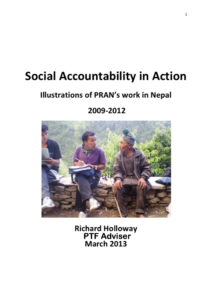
REPORT
Social Accountability in Action: Illustrations of PRAN’s work in Nepal (2009-2012)
Richard Holloway
2013
The World Bank is enthusiastic about social accountability (SA) as a mechanism for improving governance, and, using funds from the State and Peace Building Trust Fund, has, in Nepal set up the PRAN program in Nepal with this in mind. To date, the Bank has given a lot of attention to the supply side of improving governance, assisting the government to improve public financial management, civil service, procurement and the like, but recognizes that more needs to be done on the demand side.
The demand side (or social accountability) refers to a process of strengthening the ability of citizens, CSOs, and other non-state actors to work with governments to hold them accountable and responsible for laws and regulations that have been passed (but often not implemented or executed) and encouraging them to be fully transparent and responsive to citizen’s needs.
This is the first effort of this kind in Nepal by the World Bank and is somewhat of a pilot1: the outcome (according to the original project paper), is meant to be:
A civil society sector with a considerable array of Social Accountability skills and a good knowledge of Socccountability tools that would enable CSOs to engage actively and effectively in holding public agencies accountable. The impact would be improved public service delivery, reduced corruption, and greater transparency and responsiveness among government agencies to citizens and hence improved development outcomes.
This illustrative report shows that this indeed can be achieved: it is based on the work of 19 CSOs working in many VDCs (Village Development Committees) in 25 very different Municipalities and Districts, using 15 different kinds of social accountability mechanisms in three themes. The report will, I hope, stimulate much thought about how social accountability works in practice and how the demonstration work of PRAN can be replicated and expanded to achieve the overall impact desired.
This report does not aim to be a rigorous impact evaluation from a third party, or a value for money study – that is a different task. This illustrative report suggests, from a very small (though representative) sample, how social accountability works, and how it can be applied in Nepal through Nepali CSOs, working with the agencies of local government. It looks at what has been achieved by 19 Nepali CSOs using a variety of social accountability tools working in the three themes of Public Financial Management, Public Service Delivery, and Municipal Good Governance.
This report describes what has been achieved by PRAN from Oct 2010 until October 2012. PRAN was subsequently, in Sept 2012, given an extension and additional funding to continue its existing work until Dec 2013, and then was given another grant, but specifically only for Public Financial Management Reform, from the Nepal Multi Donor Trust Fund to run until Jun 2014, with an expected extension and additional funding to Jun 2015. This report, therefore, only describes PRAN’s work until Oct 2012. Lessons need to be learnt from these 19 experiences to inform the extensions.

